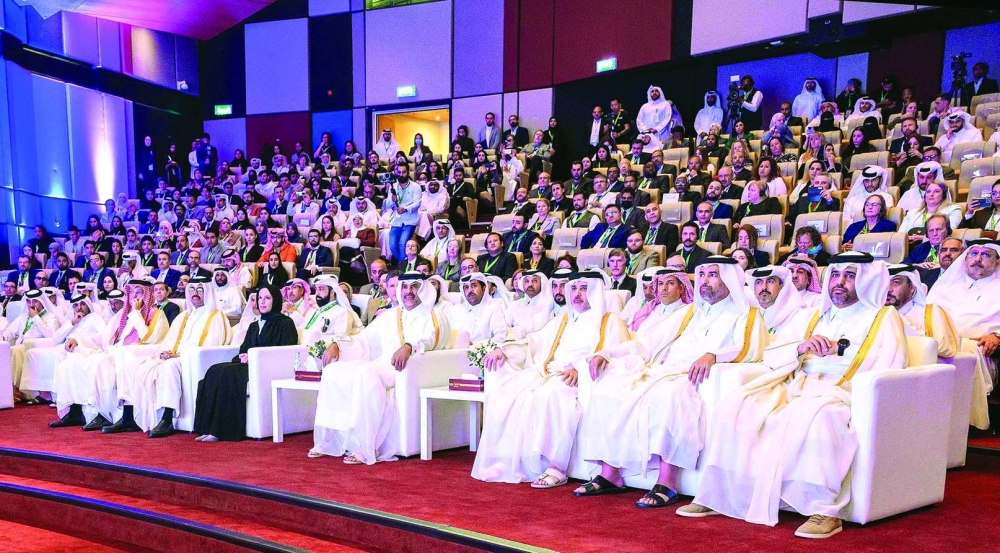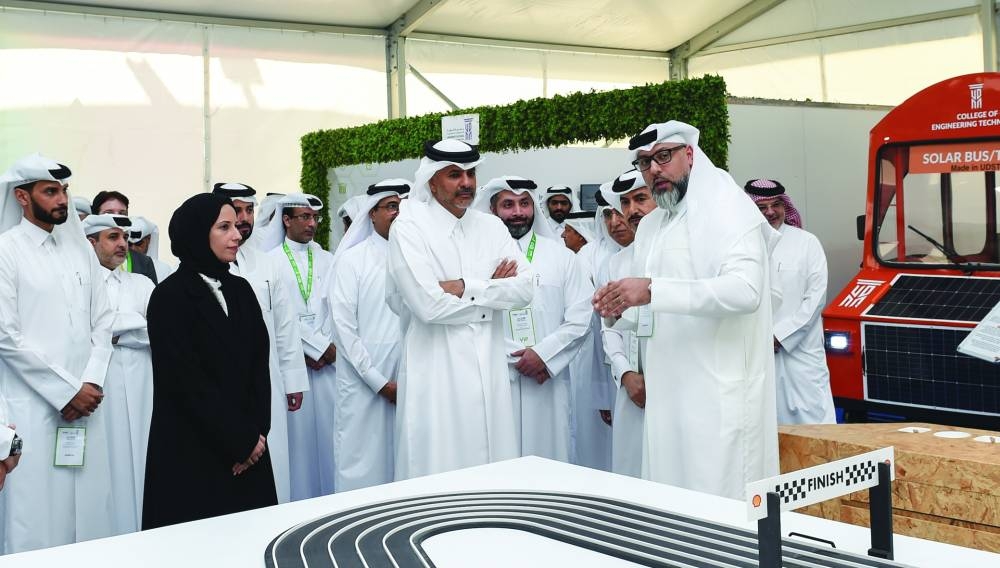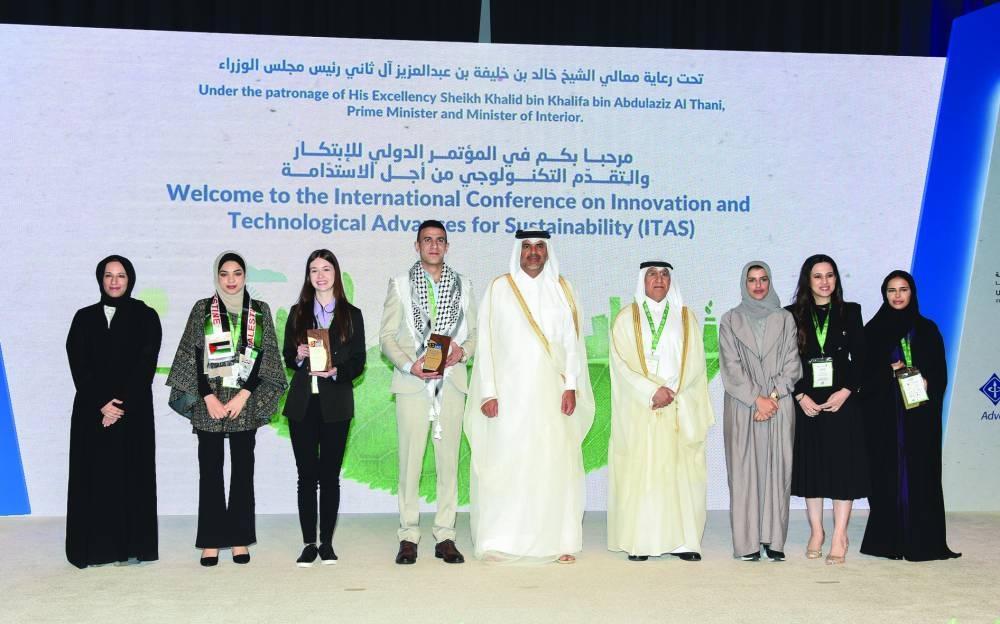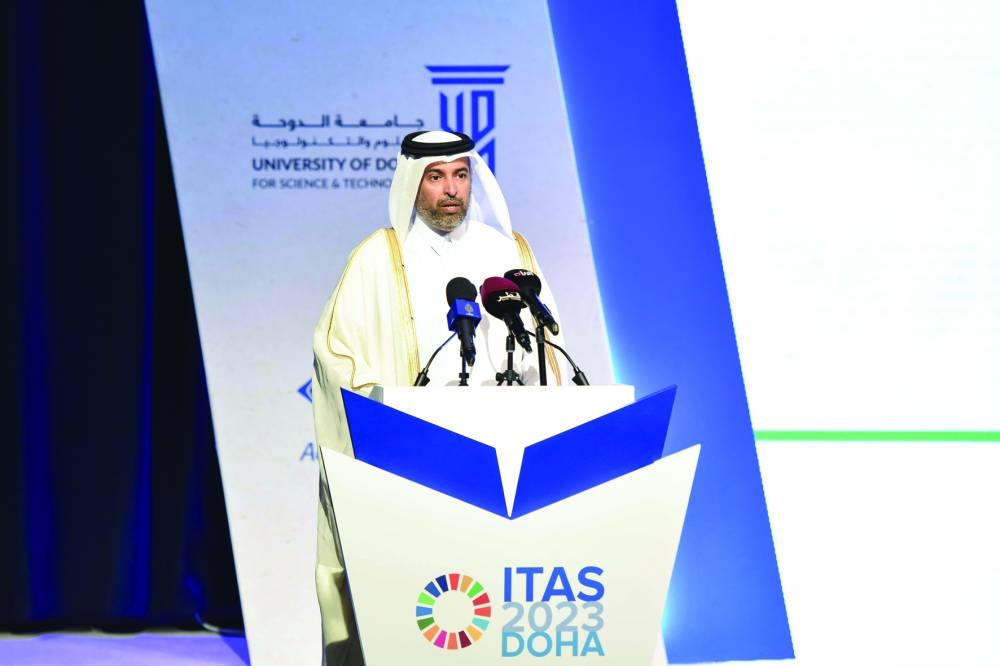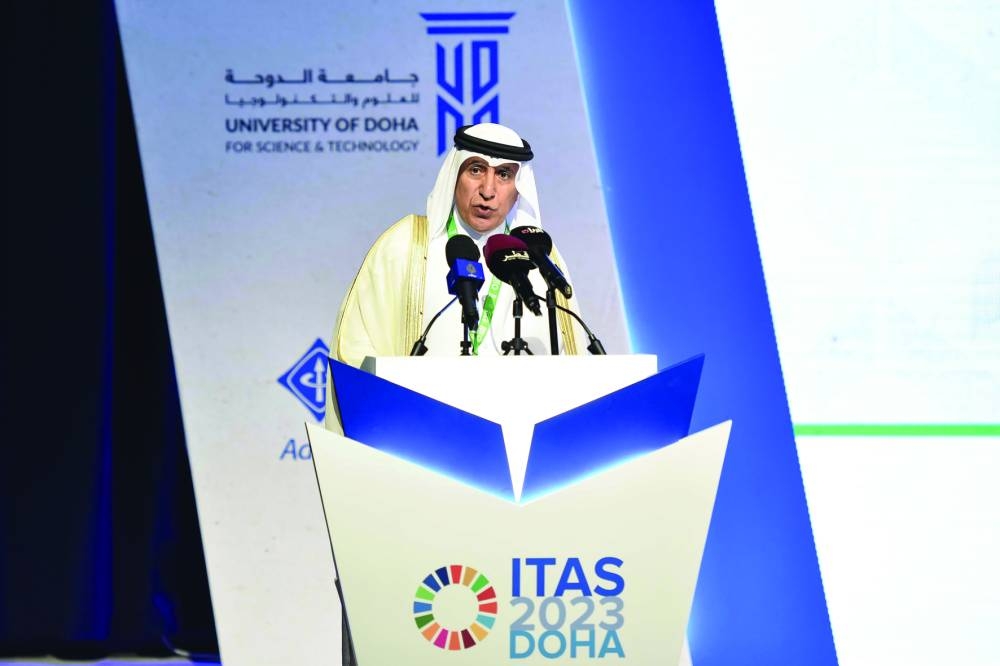HE the Prime Minister and Minister of Interior Sheikh Khalid bin Khalifa bin Abdulaziz al-Thani attended on Thursday the first edition of the International Conference on Innovation and Technological Advances for Sustainability (ITAS 2023|) at Dukhan Hall, University of Doha for Science and Technology (UDST). During the conference, HE Sheikh Khalid watched a documentary on innovation and sustainability in Qatar and the most important progress and technological development that contributes to economic, social, and environmental development. He also honoured the winners of ITAS Arab Youth Competition 2023. HE the Prime Minister also inaugurated the conference's exhibition, which aims to display the latest international technologies used in the field of technology and engineering provided by participating companies and institutions. The conference was attended by a number of ministers, senior officials and representatives of local and regional companies, QNA reported.
The opening ceremony was also attended by a number of ministers, senior officials from Qatar and abroad, experts in the fields of food security, environment, energy, economy, and digital technologies, along with academics, researchers, students, and representatives from government authorities and UDST partners.
The event highlights the initiatives and projects that the UDST, its partners and industry leaders are putting in place to advance sustainability in Qatar and the world.
Held in collaboration with Institute of Electrical and Electronics Engineers (IEEE), the conference is a premier forum for researchers, academics, students, policymakers, industry leaders and government officials to explore ideas, techniques and tools to implement the United Nations Sustainable Development Goals (SDGs).
The ITAS is closely aligned with Qatar National Vision 2030 and seeks to develop a pathway to improve sustainable development by introducing and adopting novel ideas, innovative solutions, and advanced technologies, and to come up with opportunities and policy recommendations that will enhance and achieve the goal of a sustainable society.
In his opening speech, HE the Minister of Environment and Climate Change Sheikh Dr Faleh bin Nasser al-Thani said: "The Ministry of Environment and Climate Change encourages research and the use of technological advances to protect the environment.”
“We believe in the value of research and development for sustaining the environment,” he said. “Our action comes in line with Qatar National Strategy for the Environment and Climate Change and the Qatar National Plan for Climate Change, where technology and research are highlighted as powerful tools for execution.”
“Undoubtedly, innovation provides solutions that keep Qatar environmentally sustainable,” HE Sheikh Dr Faleh added.
HE the Permanent Representative of Qatar to the United Nations Sheikha Alya Ahmed bin Saif al-Thani expressed her pleasure in taking part in the conference.
"Today our world faces many challenges that were made even more complicated by the coronavirus (Covid-19) pandemic, inflation, debts, the negative impact of climate change and conflicts across the world,” she said. “It is clear now that science and technology are strong platforms that can carry all efforts and collaborations forward to face complex issues.”
“This has been reflected in the multilateral efforts that were put in to manage many pressing issues such as climate change, the Covid-19 pandemic, and the renewable sources of water and energy,” HE Sheikha Alya added.
UN Assistant Secretary-General Haoliang Xu, who is also the UN Development Programme (UNDP) assistant administrator and director of the Bureau for Policy and Programme Support, said that the UNDP’s strategic partnership with Qatar is focused on the future of development, and scaling up solutions with local communities to make breakthroughs in achieving the SDGs.
On this occasion, UDST President Dr Salem Al-Naemi extended deep gratitude and appreciation to HE Sheikh Khalid for inaugurating the conference.
“Qatar has demonstrated a strong commitment to the 2030 Agenda for Sustainable Development,” he said. “This is reflected in the Qatar National Vision which aims to transform the country into an advanced society capable of achieving sustainable development by 2030."
"The UDST is proud to be the first national applied university in the country, and we affirm our commitment to sustainability which is rooted in our curricula,” Dr Al-Naemi added. “We bring it to life at every level through our projects, applied research and infrastructure.”
“Thus, we seek to promote excellence in every step we take, in line with our mission and vision that prioritise innovation and sustainable development in collaboration with academics, students, researchers, ministries, governmental bodies and UDST partners to support the implementation of sustainable development goals in the State of Qatar and the world,” he concluded.
The conference hosted a panel discussion by the UNDP Accelerator Labs Network, the world's largest and fastest learning network on sustainable development challenges.
The panel presented how the UNDP Accelerator Labs Network is co-built as a joint venture with the German Federal Ministry for Economic Co-operation and Development and the Qatar Fund for Development (QFFD), and how it taps into local innovations to create actionable insights and reimagine the concept of sustainable development in the 21st century.
The ITAS 2023 covered five tracks: Environment and Climate Change, Food Security and Sustainability, Renewable Energy Sources, Digital Technologies for Sustainable Development, and Capacity Building and Innovative Solutions for Sustainable Development.
The conference included multiple breakout sessions covering several tracks to showcase recent developments and initiatives in sustainable development.
The first track focused on environment and climate change and addresses a number of topics, including 'Climate Change: Adaptation and Mitigation', 'Climate and Environmental Modelling', 'Air and Water Pollution Control Strategies', 'Sustainable Building Design Modern Urbanisation', 'Environmentally Efficient Systems and Design', 'Environmental Engineering', 'Ecological Issues and Their Prevention', 'Drought and Forest Fires From Climate Change Perspective', and 'Environmental Degradation and Remedy'.
The second track highlighted the relationship between food security and sustainability, including 'Climate-Smart Agriculture Technologies', 'Minimising Post Harvest Losses', 'Interventions to Improve Soil and Crop Productivity', 'Greenhouse and Hydroponics Cultivations (Greenhouse Design and Optimisation)', 'Agriculture Water Management', and 'Irrigation Systems & Best Management Practices for Sustainable Agriculture'.
The third track explored the renewable energy sources through addressing 'Innovative PV Systems', 'Bioreactors for Energy Application', 'Harnessing Offshore Winds for Energy Applications', 'Implications of Renewable Energy', 'Energy Audit and Design of Sustainable Cities', 'Design of Efficient Solar and Wind Energy Systems', and 'Challenges to Adopt Technologies'.
The fourth track showcased digital technologies for sustainable development, including applications of artificial intelligence (AI) and deep learning for sustainable development, and AI-assisted drinking water management.
It also discussed sensing and control systems, mechatronics and automation for the SDGs, drones and their application for sustainable development and application of computer science and information technology.
The fifth and final track sheds light on the capacity building and innovative solutions for sustainable development.
It discussed capacity building and educational perspective of the SDGs, the waste into value-added products, and wastewater treatment technologies.
Discussions took place about economic barriers to sustainable development, social responsibility and implications, and bio-circular economy for sustainability.
It is worth noting that the UDST hosted the ITAS Arab Youth Competition 2023, during the Research and Innovation Week that was held on campus prior to the conference.
The ITAS Arab Youth Competition 2023 aimed to develop sustainable and practical solutions for Arab countries, keeping in line with the United Nations’ 17 SDGs.
The competition was open to undergraduates and postgraduates from across the Arab world to identify and solve a real problem and find sustainable solutions using technology with a special focus on one or more SDGs.
Through hosting this competition, the UDST was able to engage the youth to think critically about global challenges and come up with innovative ideas to achieve at least one of the SDGs through technology.
Winners of the Arab Youth Competition for Innovation and Technological Advances for Sustainability 2023 were announced during the opening ceremony of the conference, and were honoured by HE the Prime Minister and Minister of Interior Sheikh Khalid.
The winners of the competition were students from King Abdullah University of Science and Technology, Saudi Arabia – Nayara Vivian Huve Musskopf and Aishah Alsamdani for their project *SandX and CarboSoil as Two Practical Technologies for Realising Sustainability and Food Water Security in the GCC.
The second runners-up were students from Al-Azhar University in Palestine – Abdulrhman Akram Dabour and Rozana Saad Sukaik for their project, 'ReHope for the design of a simulator that helps children with cerebral palsy,.
In third place came students of the UDST – Reem al-Naimi and Noreen El Ahmad for their project, 'Smart White Cane,, which will grant capabilities and freedom of physical range to the blind.
The event highlights the initiatives and projects that the UDST, its partners and industry leaders are putting in place to advance sustainability in Qatar and the world.
Held in collaboration with Institute of Electrical and Electronics Engineers (IEEE), the conference is a premier forum for researchers, academics, students, policymakers, industry leaders and government officials to explore ideas, techniques and tools to implement the United Nations Sustainable Development Goals (SDGs).
The ITAS is closely aligned with Qatar National Vision 2030 and seeks to develop a pathway to improve sustainable development by introducing and adopting novel ideas, innovative solutions, and advanced technologies, and to come up with opportunities and policy recommendations that will enhance and achieve the goal of a sustainable society.
In his opening speech, HE the Minister of Environment and Climate Change Sheikh Dr Faleh bin Nasser al-Thani said: "The Ministry of Environment and Climate Change encourages research and the use of technological advances to protect the environment.”
“We believe in the value of research and development for sustaining the environment,” he said. “Our action comes in line with Qatar National Strategy for the Environment and Climate Change and the Qatar National Plan for Climate Change, where technology and research are highlighted as powerful tools for execution.”
“Undoubtedly, innovation provides solutions that keep Qatar environmentally sustainable,” HE Sheikh Dr Faleh added.
HE the Permanent Representative of Qatar to the United Nations Sheikha Alya Ahmed bin Saif al-Thani expressed her pleasure in taking part in the conference.
"Today our world faces many challenges that were made even more complicated by the coronavirus (Covid-19) pandemic, inflation, debts, the negative impact of climate change and conflicts across the world,” she said. “It is clear now that science and technology are strong platforms that can carry all efforts and collaborations forward to face complex issues.”
“This has been reflected in the multilateral efforts that were put in to manage many pressing issues such as climate change, the Covid-19 pandemic, and the renewable sources of water and energy,” HE Sheikha Alya added.
UN Assistant Secretary-General Haoliang Xu, who is also the UN Development Programme (UNDP) assistant administrator and director of the Bureau for Policy and Programme Support, said that the UNDP’s strategic partnership with Qatar is focused on the future of development, and scaling up solutions with local communities to make breakthroughs in achieving the SDGs.
On this occasion, UDST President Dr Salem Al-Naemi extended deep gratitude and appreciation to HE Sheikh Khalid for inaugurating the conference.
“Qatar has demonstrated a strong commitment to the 2030 Agenda for Sustainable Development,” he said. “This is reflected in the Qatar National Vision which aims to transform the country into an advanced society capable of achieving sustainable development by 2030."
"The UDST is proud to be the first national applied university in the country, and we affirm our commitment to sustainability which is rooted in our curricula,” Dr Al-Naemi added. “We bring it to life at every level through our projects, applied research and infrastructure.”
“Thus, we seek to promote excellence in every step we take, in line with our mission and vision that prioritise innovation and sustainable development in collaboration with academics, students, researchers, ministries, governmental bodies and UDST partners to support the implementation of sustainable development goals in the State of Qatar and the world,” he concluded.
The conference hosted a panel discussion by the UNDP Accelerator Labs Network, the world's largest and fastest learning network on sustainable development challenges.
The panel presented how the UNDP Accelerator Labs Network is co-built as a joint venture with the German Federal Ministry for Economic Co-operation and Development and the Qatar Fund for Development (QFFD), and how it taps into local innovations to create actionable insights and reimagine the concept of sustainable development in the 21st century.
The ITAS 2023 covered five tracks: Environment and Climate Change, Food Security and Sustainability, Renewable Energy Sources, Digital Technologies for Sustainable Development, and Capacity Building and Innovative Solutions for Sustainable Development.
The conference included multiple breakout sessions covering several tracks to showcase recent developments and initiatives in sustainable development.
The first track focused on environment and climate change and addresses a number of topics, including 'Climate Change: Adaptation and Mitigation', 'Climate and Environmental Modelling', 'Air and Water Pollution Control Strategies', 'Sustainable Building Design Modern Urbanisation', 'Environmentally Efficient Systems and Design', 'Environmental Engineering', 'Ecological Issues and Their Prevention', 'Drought and Forest Fires From Climate Change Perspective', and 'Environmental Degradation and Remedy'.
The second track highlighted the relationship between food security and sustainability, including 'Climate-Smart Agriculture Technologies', 'Minimising Post Harvest Losses', 'Interventions to Improve Soil and Crop Productivity', 'Greenhouse and Hydroponics Cultivations (Greenhouse Design and Optimisation)', 'Agriculture Water Management', and 'Irrigation Systems & Best Management Practices for Sustainable Agriculture'.
The third track explored the renewable energy sources through addressing 'Innovative PV Systems', 'Bioreactors for Energy Application', 'Harnessing Offshore Winds for Energy Applications', 'Implications of Renewable Energy', 'Energy Audit and Design of Sustainable Cities', 'Design of Efficient Solar and Wind Energy Systems', and 'Challenges to Adopt Technologies'.
The fourth track showcased digital technologies for sustainable development, including applications of artificial intelligence (AI) and deep learning for sustainable development, and AI-assisted drinking water management.
It also discussed sensing and control systems, mechatronics and automation for the SDGs, drones and their application for sustainable development and application of computer science and information technology.
The fifth and final track sheds light on the capacity building and innovative solutions for sustainable development.
It discussed capacity building and educational perspective of the SDGs, the waste into value-added products, and wastewater treatment technologies.
Discussions took place about economic barriers to sustainable development, social responsibility and implications, and bio-circular economy for sustainability.
It is worth noting that the UDST hosted the ITAS Arab Youth Competition 2023, during the Research and Innovation Week that was held on campus prior to the conference.
The ITAS Arab Youth Competition 2023 aimed to develop sustainable and practical solutions for Arab countries, keeping in line with the United Nations’ 17 SDGs.
The competition was open to undergraduates and postgraduates from across the Arab world to identify and solve a real problem and find sustainable solutions using technology with a special focus on one or more SDGs.
Through hosting this competition, the UDST was able to engage the youth to think critically about global challenges and come up with innovative ideas to achieve at least one of the SDGs through technology.
Winners of the Arab Youth Competition for Innovation and Technological Advances for Sustainability 2023 were announced during the opening ceremony of the conference, and were honoured by HE the Prime Minister and Minister of Interior Sheikh Khalid.
The winners of the competition were students from King Abdullah University of Science and Technology, Saudi Arabia – Nayara Vivian Huve Musskopf and Aishah Alsamdani for their project *SandX and CarboSoil as Two Practical Technologies for Realising Sustainability and Food Water Security in the GCC.
The second runners-up were students from Al-Azhar University in Palestine – Abdulrhman Akram Dabour and Rozana Saad Sukaik for their project, 'ReHope for the design of a simulator that helps children with cerebral palsy,.
In third place came students of the UDST – Reem al-Naimi and Noreen El Ahmad for their project, 'Smart White Cane,, which will grant capabilities and freedom of physical range to the blind.

